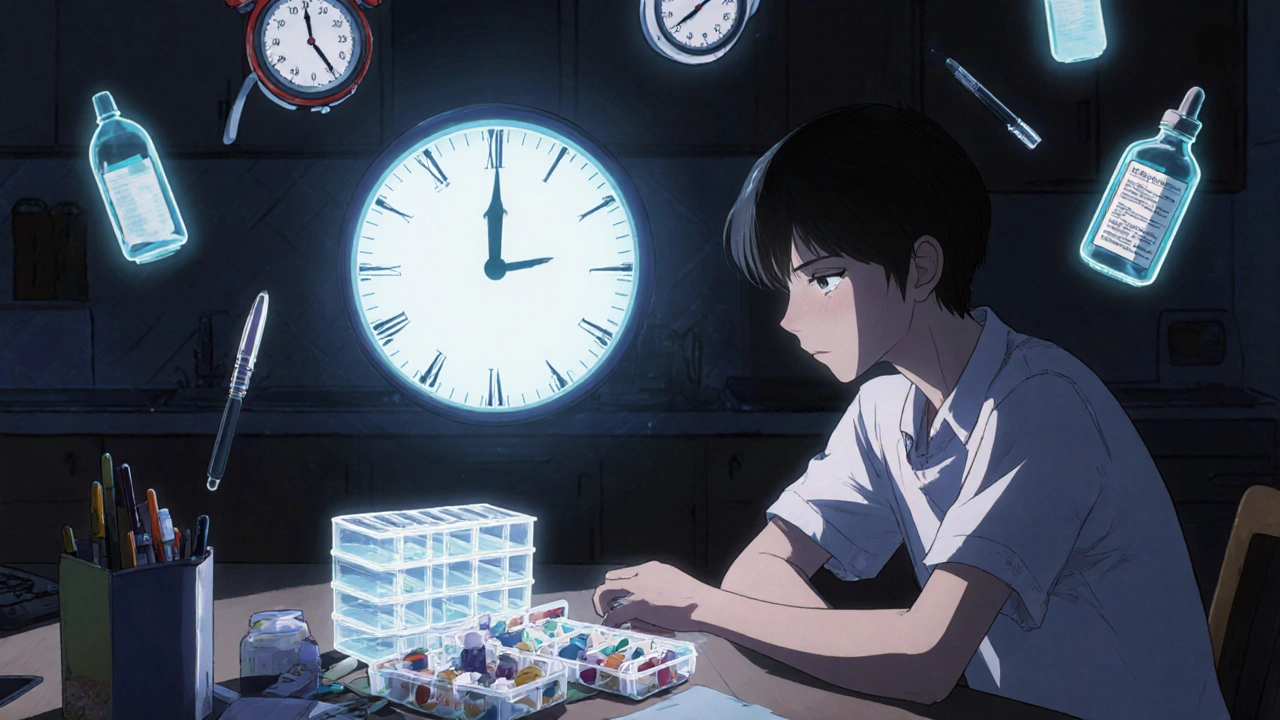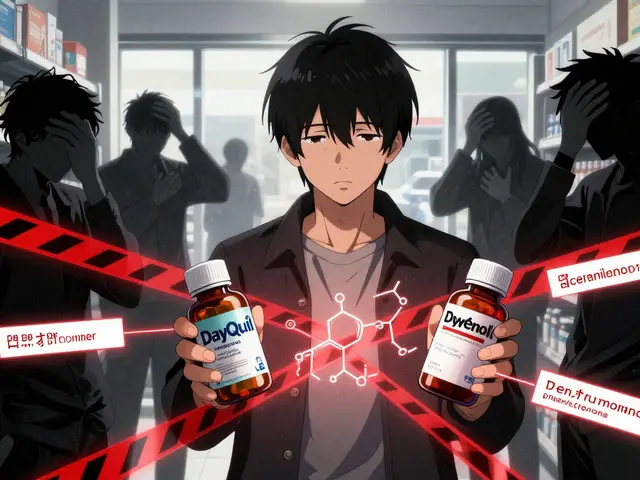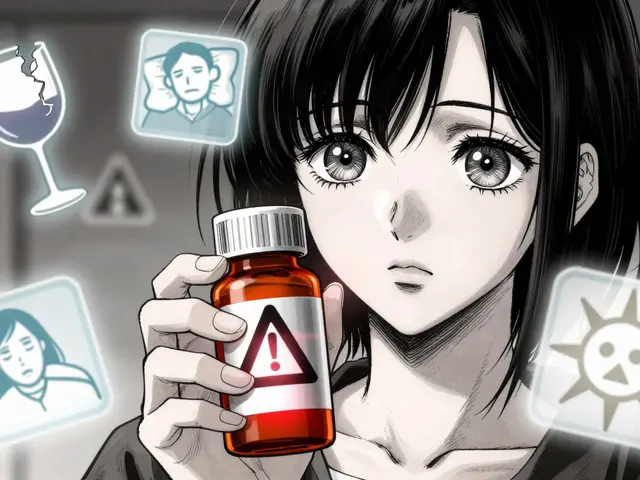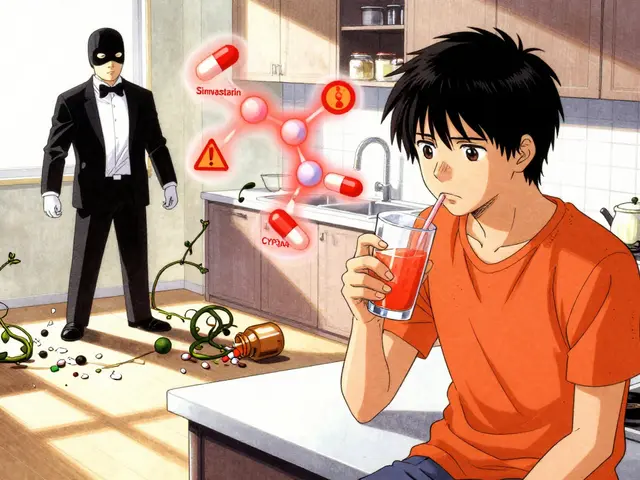Skipping a dose of your prescription medicine might seem harmless-especially if you’re feeling fine. Maybe you forgot. Maybe you were busy. Maybe you thought, "I don’t need it today." But that one missed pill can do more damage than you realize. It’s not just about remembering to take your meds. It’s about keeping your body in balance, day after day, hour after hour.
Why Timing Matters More Than You Think
Your body doesn’t work in bursts. It works in rhythms. When you take a prescription medication, it’s designed to maintain a steady level in your bloodstream. Too little, and the drug stops working. Too much, and you risk side effects. But the real danger comes from inconsistency. Take antibiotics, for example. You start feeling better after three days, so you stop. Sounds smart, right? Wrong. The bacteria that made you sick aren’t all gone. The strongest ones survive. And now they’ve learned how to fight the medicine. That’s how antibiotic resistance starts. The CDC says you must finish every single pill, even if you feel fine. Skipping even one dose can turn a simple infection into a nightmare. Same goes for blood pressure meds. High blood pressure doesn’t give you symptoms. You don’t feel it. So when your numbers look normal after a week of pills, you think, "I don’t need this anymore." But your arteries are still under pressure. Skipping doses causes dangerous spikes and drops. Those swings strain your heart, increase stroke risk, and can lead to kidney damage over time. The American Heart Association says nearly half of American adults have high blood pressure-and up to half of them don’t take their meds as prescribed. That’s not just risky. It’s deadly.The Silent Killers: Anticoagulants, Diabetes, and Transplant Drugs
Some medications have almost zero room for error. Warfarin, for instance, thins your blood to prevent clots. But if you take it at different times each day, your INR levels swing. Too high? You could bleed internally. Too low? You could have a stroke. Patients on warfarin need regular blood tests-every 2 to 4 weeks-to make sure they’re in the safe zone. Miss a dose, and you’re playing Russian roulette with your life. Diabetes meds are just as precise. Insulin or oral drugs like metformin are timed to match your meals. Skip a dose before eating? You risk a dangerous drop in blood sugar-dizziness, confusion, even seizures. Take it when you shouldn’t? You could crash into hypoglycemia. This isn’t about feeling sluggish. This is about ending up in the ER. And if you’ve had an organ transplant? Immunosuppressants are your lifeline. These drugs stop your body from rejecting the new organ. But they need to be taken at the exact same time every day. One missed dose can trigger rejection. And once rejection starts, it’s often irreversible. Transplant patients don’t get second chances.
Why People Skip-And How to Fix It
People don’t skip doses because they’re careless. They skip because it’s hard. - You’re on five different pills. Each one has a different schedule: "take with food," "take on empty stomach," "take at bedtime." - You’re older. Your memory isn’t what it used to be. - You’re worried about side effects. - You can’t afford the refill. - You don’t understand why you need it. A family doctor in rural Alabama found that the #1 reason patients mess up their meds? They didn’t understand the instructions. Not because they weren’t smart. Because the doctor rushed. The pharmacist didn’t explain. The label was too small. Here’s what actually works:- Use a pill organizer. Weekly boxes with morning, afternoon, evening, and night slots make it impossible to miss. Free ones are often offered by pharmacies or Medicare plans.
- Set phone alarms. Label them: "Warfarin - 8 AM," "Insulin - before breakfast."
- Pair meds with habits. Take your pill right after brushing your teeth. Or with your morning coffee. Your brain links the action to the routine.
- Ask for a medication review. Every 3 months, sit down with your pharmacist. They’ll check for interactions, simplify your schedule, and tell you which pills are most important.
- Use the teach-back method. Before you leave the doctor’s office, say: "So, just to make sure I got this right-I take the blue pill with breakfast, the white one at bedtime, and I skip the green one if I’m nauseous?" If they nod, you’re good.
The Real Cost of Skipping
It’s not just your health. It’s the system. Every year in the U.S., medication non-adherence leads to 125,000 preventable deaths. It causes 10 to 25% of all hospital admissions. That’s not just a statistic. That’s someone’s mom. Someone’s dad. Someone’s neighbor. Insurance companies and hospitals spend billions trying to clean up the mess. And guess who pays? You do-through higher premiums, longer wait times, and more stress on the system. The good news? Most of these problems are reversible. If you start taking your meds on time again, your blood pressure can drop. Your blood sugar can stabilize. Your risk of infection can go down. You don’t need to be perfect. Just consistent.What to Do Right Now
Don’t wait for a crisis. Don’t wait until you feel worse. Start today.- Look at your prescription bottle. Read the label. What time should you take it? With food or without?
- Check your pillbox. Are any slots empty? Did you miss any doses this week?
- Call your pharmacy. Ask if they offer free pill organizers or medication reminders.
- Write down your meds: name, dose, time, purpose. Keep it on your fridge.
- Next time you see your doctor or pharmacist, say: "I want to make sure I’m taking this right. Can we go over it?"
It’s Not About Being Perfect. It’s About Being Reliable.
You don’t need to be a superhero. You don’t need to remember every single pill at every single hour. You just need to make it a habit. A simple, daily habit. Your body is counting on you. Not tomorrow. Not next week. Today. If you take your meds on time, you’re not just avoiding a hospital visit. You’re choosing to live longer. To feel better. To be there-for your family, your friends, your future. That’s not just good medicine. That’s life-saving.What happens if I skip one dose of my blood pressure medication?
Skipping one dose can cause your blood pressure to spike suddenly, which strains your heart and blood vessels. Over time, this increases your risk of stroke, heart attack, or kidney damage. Even if you feel fine, high blood pressure is silent-so skipping doses doesn’t mean you’re safe.
Can I double up on my next dose if I miss one?
Never double up unless your doctor tells you to. Doing so can push your drug levels into a dangerous range. For example, doubling a blood thinner like warfarin could cause severe bleeding. Always check with your pharmacist or doctor before adjusting your dose.
Why do some pills need to be taken with food and others on an empty stomach?
Food can change how your body absorbs the medicine. Some drugs need an empty stomach so they’re absorbed quickly and fully. Others need food to reduce stomach upset or to help them work properly. For example, antibiotics like tetracycline don’t work well with dairy, while cholesterol meds like atorvastatin work better with food.
I’m on five different medications. How do I keep track?
Use a weekly pill organizer with compartments for morning, afternoon, evening, and night. Set phone alarms for each dose. Ask your pharmacist for a medication list with times and purposes. Many pharmacies offer free apps or automated call reminders. You can also ask for a simplified regimen-sometimes two pills can be combined into one.
I can’t afford my prescriptions. What should I do?
Talk to your pharmacist. Many drug manufacturers offer patient assistance programs that give free or low-cost meds to those who qualify. Medicare Part D and some state programs also help. Never skip doses because of cost-there are solutions. Your health is worth more than the price tag.
Do pharmacists really help with medication timing?
Yes. Pharmacists are trained in medication therapy management. They review all your prescriptions for timing conflicts, side effects, and unnecessary duplicates. Many offer free consultations to help you simplify your routine. You don’t need a doctor’s referral-just walk in and ask.







David Barry
November 14, 2025 AT 12:18